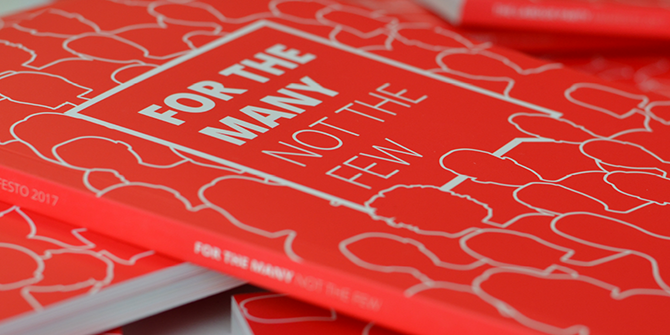 Throughout Labour’s history, there has been a lack of consensus over who has a say in manifestos, explains Robin Pettitt. On the one hand are those who favour parliamentary independence when it comes to agreeing on policies, and on the other are those who favour the involvement of grassroots members, rendering the manifesto-making process an ongoing organisational struggle.
Throughout Labour’s history, there has been a lack of consensus over who has a say in manifestos, explains Robin Pettitt. On the one hand are those who favour parliamentary independence when it comes to agreeing on policies, and on the other are those who favour the involvement of grassroots members, rendering the manifesto-making process an ongoing organisational struggle.
Party manifestos play a critical role in UK politics: doing or not doing what is in your manifesto for a given election will be a central element of the political debate at the subsequent election. We can see the evidence of this in Labour’s fondness for ‘pledge cards’ from the late 1990s onwards, summarizing the key elements of the manifesto; the Liberal Democrats’ staggering fall from grace after walking away from their tuition fees pledge; and the Conservatives insisting on sticking to their manifesto pledge on cutting net migration, despite the evidence of the damage it is doing to people, employers, and the occasional Home Secretary.
In the case of the Labour Party, manifestos are and have always been extremely controversial, and somewhat traumatic to produce. The party’s troubles are caused by the widespread consensus on the central importance of manifestos, combined with an equally widespread lack of consensus on how manifestos should be produced. Put slightly simplistically, the debate over how the manifesto is to be produced is divided between those who favour parliamentary independence, and those who favour grassroots control.
The parliamentary independence stance is based on the idea that, whilst democracy may be of the people and for the people, the ‘by the people’ element is fairly limited. Democracy is a competition between competing elites, who once elected should be allowed to get on with the job without much active intervention from the electorate. The electorate is so called because they elect those who govern, and then their job is largely done. The grassroots control argument is based on two assumptions. One is that because it is the grassroots that are out knocking on doors and therefore play a major role in getting MPs elected, those same MPs owe it to the grassroots to do as the grassroots want (at least to a fairly significant degree). The other is that popular participation in political decision-making is generally ‘a good thing’ and should therefore be encouraged.
Generally speaking, the parliamentary independence view has been associated with the centre-right of Labour, which has traditionally been in control of the upper reaches of the party. Conversely, the grassroots control view has been found mostly on the left of the party (and the more left the greater the extent of the level of control demanded). This suggests that the struggle over how the manifesto is made is really a proxy war over what the manifesto should say. Control the process, and you control the contents.
The parliamentary independence supporting centre-right of the party, has always been happy to follow party conference decisions, provided they agreed with them and usually only got touchy about parliamentary independence when faced with a defeat at party conference. Likewise, ‘grassroots control’ can take many forms, and the left of the party has tended to favour processes they felt they could control.
 Credit: The Labour Party.
Credit: The Labour Party.
Since the founding of the Labour Party in 1900 the parliamentary independence argument has more often than not been the prevailing view of the party leadership. It has also been the de facto approach in practice, despite some attempts at making the process at least vaguely democracy scented.
Throughout the party’s history, manifesto-related clashes have been a regular feature of its organisational life. These clashes have usually found their most dramatic (some would say entertaining) form at the annual party conference under the glaring light of the watching media. One of Tony Blair’s main organisational goals was ending these image-unfriendly clashes. The New Labour leadership did so by moving the main focus of policy debate away from the annual conference and into a more private process. This certainly had the effect of reducing debate at conference, but also saw a gradual loss of activists and, by extension, votes.
It could be argued that whilst damaging to the party’s public appearance of unity, the clashes at party conference had the effect of blowing off some of the ‘grassroots control’ camp’s frustration. The unexpected and huge success of Jeremy Corbyn’s leadership campaigns could be at least partly attributed to the build-up of frustration amongst the members at being usually ignored and sometimes browbeaten by a ‘staying on message’ obsessed leadership under Tony Blair, Gordon Brown, and to a lesser extent Ed Miliband.
What is still uncertain is the extent to which the debate between parliamentary independence and grassroots control is primarily about genuine differences in opinion over the nature of democracy – or rather a reflection of the ongoing power struggle between different ideological camps in the party. The open question now is whether the left’s recent (and as is the way in politics, temporary) successes in taking control of the top of the party will lead to a genuine shifting of policy making power down towards the base of the party.
The suspicion is that any reform of the policy-making process pushed by the ‘grassroots control’ supporting left-wing of the party will be in the form of something they feel able to control (e.g. focussed on long and tedious meetings where only the truly devoted attend vs. more open and less predictable membership-wide ballots). One key potential flashpoint in this context is what would happen if a strongly pro-Remain policy made its way through the party’s decision-making processes and was passed by party conference. Would Corbyn and his immediate supporters accept and actively implement a policy they are at the very least highly lukewarm about? In either case Labour’s troubled manifesto-making process is likely to continue being a source of organisational grief for the party (and mild amusement to those of us watching).
_________
Note: the above draws on the author’s published work in Party Politics.
 Robin Pettitt is Senior Lecturer in Comparative Politics at Kingston University.
Robin Pettitt is Senior Lecturer in Comparative Politics at Kingston University.






